Stay in the know on all smart updates of your favorite topics.
(GESLOTEN) Vacature: Communicatie- en Programmamedewerker Amsterdam Smart City (32 uur)

Ben jij thuis in de wereld van communicatie en event management? En gaat jouw hart sneller kloppen van duurzaamheid, stedelijke innovatie en netwerken?
Kom dan als junior Communicatie- en Programmamedewerker het team van Amsterdam Smart City versterken!
Wie zijn wij?
Amsterdam Smart City is een onafhankelijk innovatieplatform, dat innovatieve bedrijven, kennisinstellingen, maatschappelijke organisaties, overheden en proactieve bewoners samenbrengt en de stad van de toekomst vormgeeft. Amsterdam Smart City maakt als programma deel uit van Amsterdam Economic Board.
Samen met 29 partners werken wij aan een betere, duurzame en toekomstbestendige wereld. Daarnaast brengen we een internationale community samen van meer dan 9.000 innovatieprofessionals, studenten en geïnteresseerden. Zij ontmoeten elkaar rond verschillende thema’s en helpen elkaar verder. Door al deze partijen te verbinden, en met hen het gesprek te voeren over de grote uitdagingen in onze regio, komen we tot nieuwe verhalen en innovatieve oplossingen die bijdragen aan betere straten, buurten en steden. We richten ons met name op vier transitiethema’s: Mobiliteit, Digitaal, Energie en Circulair.
Hier staan wij voor
Iedereen is anders, en juist met verschillende mensen werken wij nog beter aan de metropool van morgen. We zijn nieuwsgierig naar jouw talenten, wat jou bijzonder maakt. We horen graag jouw ideeën en perspectieven. Dat helpt ons om samen nog meer impact te maken.
Wat ga je doen?
Je beheert onze online kanalen en je organiseert samen met het team evenementen. Met verslaglegging, enthousiasme en het maken van nieuwe connecties binnen ons netwerk versterk je ons regionale en internationale netwerk! Je werkt nauw samen met- en ondersteunt het hele Amsterdam Smart City team en de programmadirecteur. Dit zijn je taken:
Beheer en schrijven van onze wekelijkse nieuwsbrief en LinkedIn content. Je neemt initiatieven om de interactie en het bereik te vergroten.
Je houdt toezicht op de berichten op het online platform en je stimuleert leden om content te plaatsen
Beheer info mailbox (inkomende verzoeken, vragen etc.)
Ondersteuning inhoudelijke verslaglegging netwerkevenementen en werksessies, en het opmaken van presentaties
Praktische ondersteuning bij evenementen (locaties, uitnodigingen, communicatie)
Ondersteuning bij het organiseren van werksessies en het bouwen van coalities
Wie ben jij?
Je hebt wo/hbo werk- en denkniveau, een opleiding in de richting van communicatie (of vergelijkbaar);
Je hebt 1-2 jaar werkervaring en ervaring op het gebied van online communicatie/community en/of event management
Je beheerst de Nederlandse en Engelse taal uitstekend in woord én geschrift
Je hebt affiniteit met duurzaamheid, innovatie en stedelijke ontwikkelingen en je vindt het belangrijk om met je werk maatschappelijke impact te maken.
Je beschikt over voldoende algemene kennis over bovenstaande en je kan hier helder over schrijven.
Je bent proactief en nieuwsgierig
Je bent sociaal, enthousiast en houdt van netwerken en verbinden.
Wat bieden wij?
Wij bieden je een fijne werkplek op het Marineterrein in Amsterdam, met een informele en collegiale sfeer. We zijn een klein team dat nauw met elkaar en onze partners samenwerkt.
Je wordt deel van een enorm divers en dynamisch netwerk van koplopers en pioniers in stedelijke innovatie van toonaangevende organisaties in de Metropool Amsterdam. Er is veel ruimte om te leren van collega’s en specialisten uit het netwerk en je te verdiepen in de thema’s die jou interesseren. Samen leren we door te doen!
Daarnaast bieden wij:
Een functie voor 32 uur per week;
Een half-jaar-contract met uitzicht op verlenging;
Salarisindicatie €3.300 - €3.500 bruto per maand (o.b.v. 40 uur), aangevuld met vakantie- en eindejaarstoeslag.
Interesse gewekt?
Ben je enthousiast? Dan horen we graag van je! Stuur je CV en een korte motivatie uiterlijk 4 april per mail aan solliciteren@amecboard.com. De eerste gesprekken vinden plaats op 10 en 12 april. Vervolggesprekken zijn in de ochtend van 19 april. Een schrijfopdracht maakt deel uit van de procedure. Neem voor meer informatie over de functie contact op met Pelle Menke. Hopelijk spreken we elkaar snel!
Recap of Demoday #22
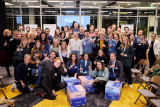
On Thursday December 14th, Amsterdam Smart City partners concluded 2023 with an afternoon full of inspiration, exchange and connections at our 22nd Demoday! Our partner Deloitte welcomed our network in The Garage, where their ‘Deloitte Studios’ department is located. In this article, we’ll give you a quick overview of the Knowledge Session, Work Sessions and Pitches. Interesting in learning more? Read the full reports by our Programme Managers Noor, Pelle and Sophie (linked below).
About our Demodays
The Demodays are one of the tools we use to stimulate innovation and encourage connection between our partners and community. The purpose of the Demodays is to present the progress of various innovation projects, ask for help, share dilemmas and involve more partners to take these projects to the next level. More information about the Demodays can be found here.
Knowledge Session: Change in the here and now, with Theory U
To kick-off our final Demoday of 2023, our brand-new partner Hieroo led an inspiring knowledge session about the change method they use for social innovation in the city: Theory U. Dorien Schneider and Maartje Krijnen taught us more about this methodology and how it can help us solve complex problems by shifting from ego to eco-thinking. Read the full report here.
Work sessions
After the plenary Knowledge Session we split up in different worksessions, each exploring regional innovation challenges. As always, we had set up the sessions’ topics and moderation in collaboration with our partners.
Mobility | Decision-making along the principles of Inclusive Prosperity – Jurhan Kwee (Municipality of Amsterdam)
In The Netherlands, the concept of ‘Inclusive Prosperity’ is on the rise. Policy makers are busy defining this concept, figuring out how to put this concept into practice and what it means for their decision-making process. Together with his colleagues at the Municipality of Amsterdam, Yurhan Kwee hosts sessions on decision-making along the principles of Inclusive Prosperity. With the input he gathers, he hopes to make the decisions needed for our Inclusive Prosperity ambitions more understandable and transparent, both for Amsterdam’s administrators and councillors as well as its citizens. Read Pelle’s recap article here.
Digital | Data Commons Collective: Using data for a liveable city – Lia Hsu (Amsterdam Economic Board) and Simone van der Burg (Waag)
In the big tech-dominated era, data has been commercially exploited for so long that it is now hard to imagine that data sharing might also benefit the community. Yet that is what a collective of businesses, governments, social institutions and residents in Amsterdam aim to do. Sharing more data to better care for the city. On behalf of the Data Commons Collective, Lia Hsu (Strategic Advisor at Amsterdam Economic Board) asked the Amsterdam Smart City network for input and feedback on their Data Commons initiative. Read Sophie's recap article here.
Energy | How can we continue to facilitate the homeowner in driving the energy transition? | Wouter van Rooijen (Alliander)
Wouter van Rooijen (Alliander) discussed the challenges related to grid congestion. From 2030 onwards, it is expected that a significant portion of the low-voltage network will experience both over- and under-voltage. While the network will be reinforced as quickly as possible, the lack of labour capacity is also prompting the consideration of alternative solutions.
The solution that emerged from Wouter's co-creation process was WijkWise. In this work session, Wouter aimed to validate the WijkWise concept and find parties that could contribute to its development and market implementation. Dave van Loon from Kennisland moderated the session. Read Noor’s recap article here.
Circular | Navigating eco-emotions: The impact of working in sustainability on your mental wellbeing| Marian Zandbergen (Hogeschool van Amsterdam)
This work session, led by Marian Zandbergen (CIRCOLLAB, HvA) and moderated by Mareille de Bloois (Royal HaskoningDHV), explored the challenges and opportunities associated with eco-emotions, both personally and within organizations. The key question addressed was: How can individuals and organisations constructively manage eco-emotions, and what implications does this have for organisations? Read Noor’s recap article here.
Pitches
To end this festive afternoon and the year 2023 as a whole, we invited project owners and -members to present their progress and next steps on topics brought in during our events and deep-dives throughout 2023. The following projects were presented. You can read more about these topics on their dedicated articles and project pages, linked below.
Local Energy Systems: Where we started, what we have achieved, and what are the next steps – Omar Shafqat (University of Applied Sciences Amsterdam)
Connecting the resource- and energy transition – Edwin Oskam (MRA)
ChatGPT and the government: Possibilities and impact on our work – Jeroen Silvis (Province of North Holland)
Floating urban districts: Future-proof living in the Metropolitan Region – Joke Dufourmont (AMS Institute)
Mobility Justice: Raising the topic of Mobility Poverty and the working group’s progress – Bas Gerbrandy (Province of North Holland)
Our next Demoday will take place in April. Do you have an inspiring story or project you want to pitch to the Amsterdam Smart City network? Let us know via sophie@amsterdamsmartcity.com
Demoday #20: Knowledge session ‘Power in Transitions’
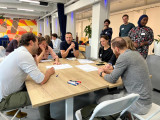
When working together on transitions, it is important to be aware of and sensitive to the impact of power and systemic oppression in participatory processes. Within the Amsterdam Smart City network, the question of inclusion and civic participation, is often brought up in worksessions and discussions. However, we often lack the tools to find the bottlenecks and really include all important beneficiaries.
Therefore, we asked our valued partners Kennisland and DRIFT to lead a workshop about Power in Transitions at Demoday #20 on May 16. Dave van Loon and Faduma Mukhtar (Kennisland) together with Aron Teunissen (DRIFT) taught the participants more about power in transitions, based on the Power Literacy Framework and Field Guide from Kennisland. This guide describes five different forms of power and offers a set of tools for professionals to become more aware of power dynamics in their work.
The five forms of power
According to the Power Literacy Guide by Kennisland, there are five forms of power in design process. If you want to learn more about this, you can download the Power Literacy guide here. The five forms of power are:
Privilege: The type of power you get from a social relation whereby you benefit due to the social group you belong to, at the expense of another social group. It is an unearned advantage and often invisible to those who have it.
Access power: The ability to influence who is included in and excluded from the design project and process.
Goal power: The ability to initiate the design project to begin with, as well as the ability to influence decisions related to framing the problem, goals, and structure of the design process.
Role power: The ability to influence the roles that different stakeholders take on. This includes the ability to assign any roles or titles in the design process, as well as influencing the role each stakeholder plays in making decisions.
Rule power: The ability to influence the way that those in the design process will work together. It includes the ability to influence what is considered normal, what is allowed and what isn’t, how actors will communicate with each other, what language is used, and beliefs about what types of knowledge are valid.
Power check
After a theoretical introduction of the five forms of power, we split into smaller groups to perform a so-called power check for different Amsterdam Smart City projects, such as the Mobility Challenge and “Wat mensen beweegt”. Using this power check, the participants looked at access power and goal power. We identified all actors affected by the project and indicated which actors were not involved. The different actors were then assigned a role in different stages of the process: listener, co-creator, advisor, partner or director.
Most important take-aways
The goal of this exercise was to create more awareness about involving target groups in different stages of the project. The main take-aways were:
The role for the for the ‘benefit group’, the people that are impacted by the project, is often too small. If beneficiaries are involved, this often happens in the last stages of the project. In this phase in the project, it is often more difficult or not possible at all to influence decision-making;
To create equal power, some parties have to ‘give away’ (some of) their power;
Truly inclusive work takes time, effort and money. It is not something takes place overnight;
Awareness is half of the battle: make the topic of systemic oppression in participatory process a structural part of your (work)process).
Want to learn more about power in transitions? Read more.
Transition Day 2023: An integral approach to the circular energy transition
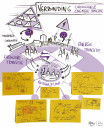
The transition towards a circular economy and the energy transition are both needed to reach a sustainable economy and society. The two are intertwined, as the materials needed for the energy transition (such as solar panels) are enormous and the speed of the energy transition is very dependent on the availability of sustainable raw materials, scarce earth metals and biomass. An integral approach is needed in the Metropolitan Region Amsterdam.
Metropolitan Region Amsterdam (MRA), City of Amsterdam, Province of North Holland (PNH) and Amsterdam Economic Board commit to actively stimulating this integral approach. In the session on the Transition day, we explored what the current connection or disconnection is between the two transitions in order to define the best next step.
Insights of the session
Led by Marielle de Bloois of Royal HaskoningDHV, all participants drew the current situation of both transitions. By explaining our drawings to each other, we all got new insights into the current situation and barriers between the two transitions. The main findings, visualised by Thomas van Daalen of Flatland are:
- There is enormous attention for the energy transition in terms of money, people and communication;
- There is only little attention for circular economy whilst the urgency is nothing less;
- People working on the transitions are working in separate teams with little connection whilst they are working on the same societal challenges;
- The circular economy is unknown and complex. If people want to connect the transitions they don’t know where to start;
- We have to rethink and link our narrative and connect people working on both transition and connect solutions.
The next steps
The session has led us to valuable new insights, and the participants are ready to take the next steps. For now, we have agreed on the following:
- The participants from the municipality of Haarlemmermeer will internally make a connection with their colleagues working on the energy transition.
- Eurofiber will dive deeper into available knowledge within their organisation.
- Edwin from the MRA will take the lead in setting up an approach with Province of North Holland, City of Amsterdam and Amsterdam Economic Board to make sure the topic of the circular energy transition will be part of the MRA agenda 2024.
- Amsterdam Smart City will keep the topic on the agenda and connect the right people around it.
3 Ways to learn more about Amsterdam Smart City

Do you want to connect, learn, and exchange experiences about Amsterdam Smart City? We have designed programs to help you connect to Amsterdam’s innovation ecosystem and key learnings from projects in the Amsterdam metropolitan region. Here are our most popular programs:
Smart City the Amsterdam Way
We give you an overview of Amsterdam Smart City’s program, governance and key projects. It’s a light way to get introduced to it all in 1,5 hours and we can also offer this online.
Timing & cost: 1.5h hours, from €400 per groupAmsterdam Smart City Deep Dives
Go on a Deep Dive with Amsterdam Smart City and get to the bottom of the energy, mobility, digital city or circular economy transition during this customized 2,5 hour session with multiple experts from Amsterdam’s ecosystem.
Timing & cost: 2.5 hours, from €600 per groupSmart City Experience
Since 2016, Amsterdam Smart City has hosted more than 300 customized study programs, innovation journeys and trade missions from over 30 countries. With the Smart City Experience we offer tailor-made programs consisting of expert meetings and project visits connecting local and (inter)national stakeholders to the Amsterdam Smart City approach and innovation ecosystem. To request a Smart City Experience, send a request at least one month in advance to cornelia@amsterdamsmartcity.com.
Timing & cost: 6-8 hours, from €1,500 per group
Where do the Amsterdam Smart City Programs take place?
Most programs take place, or at least start at, the Smart City Lab on the Marineterrein Innovation District. This is a "small space for big ideas" where we showcase examples of smart city solutions from Amsterdam. The Smart City Experience Lab is also a workplace where Amsterdam Smart City partners meet and collaborate. Groups visiting the Experience Lab can also visit the Marineterrein Amsterdam Living Lab on their own or as a part of an organized program.
Over Morgen - De toekomst van tankstations
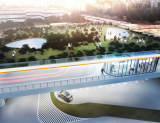
Het speelveld van de energiemarkt voor mobiliteit verandert in snel tempo. Het geloof in de verkoop van diesel en benzine verdwijnt. Gemeenten kunnen voorsorteren op de duurzame mobiele transitie door na te denken over de toekomst van huidige tankstationlocaties.
De vereisten voor het ombouwen van een tankstation tot een laadstation zijn afhankelijk van verschillende factoren, waaronder de grootte en indeling van het tankstation en de elektrische capaciteit van de ligging. Over het algemeen zal een geschikte locatie voor een laadpaal voldoende ruimte moeten bieden voor de minimale vereisten. Eveneens moet de locatie toegang hebben tot een betrouwbare en voldoende elektriciteitsvoorziening, waarvoor mogelijk upgrades van de lokale elektriciteitsinfrastructuur nodig zijn.
Onze two-pager over dit onderwerp lezen? Dat kan via deze link.
Contact over dit onderwerp opnemen? Dat kan via Hidde van der Maas of Anouk Hodemaekers.
Programma voor Demodag #20 – Energie, Circulair, Mobiliteit en Digitaal
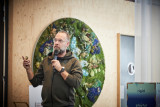
Op dinsdag 16 mei organiseert Amsterdam Smart City een Demodag rondom onze vier transitiethema’s: energie, circulair, mobiliteit en digitaal. Er staan weer veel mooie initiatieven en vraagstukken op het programma die we met ons netwerk gaan verdiepen en verrijken. De Demodag vindt plaats bij A Lab. De thuisbasis voor een community van maatschappelijk betrokken organisaties, waaronder onze partner Cenex.
Demodagen zijn onderdeel van ons innovatieproces en bedoeld om de voortgang van verschillende innovatieprojecten te stimuleren, hulpvragen op tafel te leggen, dilemma's te delen en anderen te betrekken bij projecten of uitdagingen. Dit gebeurt in de vorm van zogenaamde ‘pitches’, met een korte hulpvraag aan de hele groep, en in werksessies waarin we een aantal vragen met een kleine groep wat grondiger behandelen. Meer informatie over wat de demodagen precies zijn en waarom je mee wilt doen, vind je hier.
Klinkt het programma interessant? Je bent welkom om aan te sluiten. Laat het ons weten in de comments of mail naar info@amsterdamsmartcity.com. De Demodag is van 14:00-16:30 met een borrel na afloop.
PITCHES
Samen werken aan een groener en gezonder Nederland – Pientere Tuinen
Pientere Tuinen heeft tot doel een groenere, gezondere leefomgeving te creëren door het bewustzijn en de motivatie bij tuinbezitters te vergroten. Pientere Tuinen is een 3-jarig project waarin 7 partijen samenwerken. De unieke aanpak van Pientere Tuinen draait om drie samenhangende onderdelen: 1) Er wordt data verzameld met een slimme sensor, 2) er wordt kwantitatief en kwalitatief onderzoek gedaan naar strategieën voor een gezonde, groene leefomgeving en blijvende gedragsverandering, en 3) er wordt advies op maat gegeven aan bewoners over de inrichting en het beheer van hun tuin en te komen (obv de data en onderzoeken). Pientere Tuinen combineert technologie/data, participatie en sociale innovatie.
PublicSpaces Conferentie – PublicSpaces
Hoe bouwen we aan een internet dat werkt voor iedereen? Een online ruimte die onze gezondheid, vrijheid en bestaansmiddelen dient en niet in de houdgreep is van Big Tech? Op 27 en 28 juni organiseren PublicSpaces en Waag Futurelab de PublicSpaces conferentie met als thema: een collectief internet. In deze pitch vertellen ze meer over het inspirerende programma vol panels, keynotes, kunst, geestverruimende cultuur en meer!
Innovatie Paviljoen Marineterrein – Gemeente Amsterdam
In het toekomstige Innovatie Paviljoen op het Marineterrein gaan verschillende pilots voor duurzame innovaties plaatsvinden. Zo worden pionierende MKB’ers ondersteund en onderzoekt de gemeente welke verandering in werkwijzen en culturen er nodig is om deze innovaties op grotere schaal door te kunnen voeren. Marlies Veld neemt jullie in haar pitch mee in de plannen voor het paviljoen.
Worden alle tankstations straks laadstations? – Over Morgen
Over Morgen ontwikkelt momenteel een ‘Tankstation Transitie Plan’. In een korte maar prikkelende pitch vertellen ze meer over dit project en de vraag; worden alle tankstations straks laadstations? Want zijn traditionele stations nog wel relevant als we in de toekomst op elke hoek van de straat kunnen laden? Hoe kan de locatie de transitie naar duurzaam transport versnellen? En hoe ziet het laadstation van de toekomst er precies uit?
WERKSESSIES
Digitaal | ChatGPT en de overheid: mogelijkheden en impact op ons werk – Jeroen Silvis en Martijn Veerman, Provincie Noord-Holland
Zorgt de techniek van ChatGPT voor een revolutie in de manier waarop we werken en samenleven? Hoe zouden overheden, zoals de provincie Noord-Holland, hiermee om moeten gaan? Wat is de impact als de techniek achter ChatGPT zich doorontwikkeld en steeds prominenter wordt gebruikt, buiten en binnen de eigen organisatie? Is het een efficiënte manier om met burgers te communiceren, beleidstukken te schrijven, of statenvragen te beantwoorden? Of zouden we onze vingers er helemaal niet aan moeten branden? Tijdens deze Demodag zullen we dieper ingaan op de mogelijkheden en potentiële impact van ChatGPT op het werk van overheden. We bespreken niet alleen de technologie zelf, maar met name ook de ethische aspecten die hierbij komen kijken. Hoe kunnen ambtenaren meegenomen in het verantwoord gebruik van deze technologie?
Energie | (English session) Local smart energy systems and P2P trading governed by citizen’s energy communities; moving from research and innovation projects to replication and upscaling – Danijela Šijačić en Mark van Wees, HvA
To mitigate climate changes and reduce CO2 emissions and in accordance with different European initiatives like renewable energy directive (RED), Clean Energy Package, and climate-neutral and smart cities mission, transition of energy system to a more sustainable and decentralized one is needed. In Amsterdam, the Buiksloterham demonstration project from ATELIER is paving the way for this transition. It is an innovation R&D project where local smart energy system and P2P trading governed by citizen’s energy coop is implemented. The ambition from ATELIER/HvA is to research how to upscale and replicate that Positive Energy District (PED). HvA invites the Amsterdam Smart City network to help prepare this upscaling (in Amsterdam) by discussing the technical, economic and social perspectives
Mobiliteit | (English session) Urban Air Mobility: order in the airspace & opportunities for an inclusive mobility system – Kerry Rohrmeier (San Jose University) in collaboration with Amsterdam Smart City partners
For this worksession, our international guest Kerry Rohrmeier will discuss the future of Urban Air Mobility with the Amsterdam Smart City network. Together with some of our partners Kerry will discuss this futuristic concept and its considerations. The group will dive into matters like maintaining order in the airspace among times of areal innovations, and how urban air mobility could contribute to a more inclusive mobility system.
Circulair | Plastic: We’re loving it! Van plasticverslaving naar trendbreuk – Marten Boels, MRA
De wereldwijde hoeveelheid plastic is sinds 2000 verdubbeld. We are loving it! Het is tegelijk ook echt een probleem van onze generatie. Daarvoor kunnen we niemand de schuld geven, maar onszelf. En steeds meer bewijs wijst op de gevaren van microplastics: in het milieu, in dieren en ook in onszelf. Het is kortom hoog tijd voor een trendbreuk in het plasticgebruik. Doel van de sessie is om kennis uit te wisselen en over oplossingsrichtingen te sparren. De partners in de Metropoolregio Amsterdam (MRA) komen graag te spreken over oplossingsrichtingen.
Today’s Changemakers #1, Romy Dekker: Using Digital Technologies in The Energy Transition
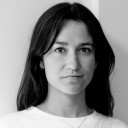
In Today’s Changemakers, we talk with pioneers in our network who are all, in their own way, shaping the city and region of the future. Our first interviewee is Romy Dekker, senior researcher at the Rathenau Instituut. She studied Cultural Anthropology and Development Sociology at Leiden University, where she quickly learned that our societal drive for growth comes at the expense of our planet, and that development does not always mean improvement for all. This insight motivated Romy to combine her interest in science with sustainability. Currently, she works as a senior researcher on topics at the intersection of sustainability, digitalisation and democracy. Her latest work caught our attention. She just started a study on how new technologies, such as Digital Twins, can contribute to tackle societal challenges in the built environment. The following paragraphs describe our insightful conversation about the complexities when using digital technology, her first learnings, and personal ambitions.
In Romy's work, she looks at the role of data and digitalisation in the energy transition in two ways. The first is data as an enabler for a just energy transition.
“The convergence of sustainability transitions and the digitisation of society represents two of the most defining trends of our era. The intersection of these trends has a significant impact on society. The Rathenau Instituut wants to provide tools for a broad discussion about what is needed to use digital technology and data for just sustainability transitions.”
“In our report Stroom van Data, we investigated how data can be used for a just energy transition. It's becoming increasingly clear that data are indispensable for the energy transition. Data can help with keeping the energy system affordable, reliable and clean, for example by better aligning the demand for and supply of energy and by providing citizens insights into their energy behaviour. However, there are also genuine concerns about citizens' control over their data, the cybersecurity of the energy supply, the environmental impact of digital technologies and the distribution of benefits and burdens of a digitalized energy-market. Addressing these issues is necessary to achieve a socially responsible energy transition.”
The second approach concerns how digital technologies, specifically Digital Twins* (definition can be found at the end of this page), can contribute to decision-making regarding spatial planning for sustainability challenges, such as the energy transition. Are Digital Twins merely a hype or a hope?
“Urgent societal challenges are often interdependent, meaning that an intervention in one area can have an impact on another; a decision to build a house somewhere, for example, has an impact on achieving other urgent energy, water, and climate goals. To tackle this complexity and improve the information available to stakeholders, public and private parties turn to data and digital technologies, and more specifically to Digital Twins.”
“However, as digital technologies and data are neither neutral nor apolitical, it is important to remain critical on how Digital Twins can contribute to tackling societal problems. The use of Digital Twins in decision-making and governance may influence our definition and understanding of problems. Consequently, it may determine what is governed, who has the ability to exercise power and be involved, and how we act. Ultimately, this can determine if social challenges are genuinely and fairly addressed. When simulating an urban region, there are also many ecological, social and political-economic aspects. How do you take these factors, which cannot easily be measured, into account?”
“Because the Digital Twin is gaining popularity as a tool for decision-making, the Rathenau Instituut will investigate how such technologies can contribute to tackling societal challenges in the built environment. Can Digital Twins help to make more integral decisions and engage citizens and other relevant stakeholders in decision-making? And if so, how? What are risks associated with using these technologies and how can they be mitigated?”
Romy’s considerations for the Amsterdam Smart City community
“A bit of an open door, but nonetheless very important; technology is a means and not an end in itself. It is important that its use takes place in a responsible manner, with an eye on public values such as equality, fairness, and democratic governance and that it is carefully considered how its use contributes to the urgent societal challenges we face. Finally, public involvement in sustainability transitions is important, but only if it takes place in a meaningful way. Otherwise, it can do more harm than good. This requires a clear answer to questions such as: is it clear what the purpose and process of public participation are and what will be done with the input?”
Using science to tackle societal challenges
“I used to doubt whether I wanted to work as a scientist or not. Because although scientists do very important work, they can sometimes be a bit disconnected from concrete societal issues, causing their work to lose relevance. I like how at the Rathenau Instituut, we really stand between science, politics and society. We want to make scientific insights accessible to a wider audience, and also actively involve citizens through participatory methods. It motivates me that in my work, I’m increasingly looking at how science, technology and innovation can contribute to tackling major societal challenges in a just way.”
“My dream for the urban region of the future? A liveable city for both humans and non-humans that operates within planetary boundaries and ensures an equitable distribution of both burdens and benefits.”
Romy and her colleagues recently started their research on using digital technologies, including Digital Twins, to address societal challenges that come together in a specific (urban or regional) area. Are you currently working on a Digital Twin project, or as a policymaker interested in the use of Digital Twins but facing certain challenges? And would you like to contribute to Romy’s research? Shoot our community manager Sophie (sophie@amsterdamsmartcity.com) a message and she will connect you with Romy!
*A digital twin (DT) can be seen as a virtual representation of a physical product, process or (eco)system. They can be used to simulate how a physical object or system will perform under different conditions and scenarios, allowing for a better understanding and optimization of processes.
Amsterdam Smart City partners aan de slag met drie urgente maatschappelijke challenges
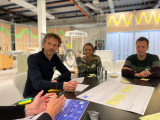
Hoe zet je de mens centraal in digitalisering? Hoe voorkom je uitsluiting van mensen die vervoer niet meer kunnen betalen? Hoe ontwikkel je samen lokale energiesystemen? Amsterdam Smart City werkt met 27 partners in co-creatie aan deze drie belangrijke vraagstukken.
Van digivaardige mensen naar mensvaardige digitalisering
Technologische en innovatieve ontwikkelingen volgen elkaar steeds sneller op. Als overheid wil en moet je hierin meegaan. Tegelijk leidt de inzet van digitalisering en data vaak tot ongewenste resultaten, wat de afstand tussen inwoners/ondernemers en de overheid vergroot.
Gemeente Haarlemmermeer verschuift haar focus van ‘het systeem staat centraal, mensen moeten maar digivaardig worden’ naar ‘de mens staat centraal, onze systemen moeten mensvaardig worden’. De onderliggende vraag is hoe zet je de mens écht centraal in digitalisering en het vormgeven van digitale systemen? De gemeente Haarlemmermeer zou graag samen optrekken om deze vragen uit te werken tot een advies dat breder inzetbaar is.
Mobiliteitsarmoede: hoe voorkomen we uitsluiting van mensen in het mobiliteitssysteem?
Stijgende benzine- en elektriciteitsprijzen; de toenemende digitalisering en afname van het openbaar vervoeraanbod zorgen er, onder andere, voor dat steeds meer mensen problemen hebben om zich te verplaatsen. Verduurzaming en deelmobiliteit lijken niet voor iedereen weggelegd en maatregelen om dit te stimuleren werken het probleem mogelijk zelfs in de hand. Het risico op sociale uitsluiting wordt hierdoor groter.
De provincie Noord-Holland en DRIFT maken zich zorgen over mobiliteitsarmoede en vragen zich af wat we eraan kunnen doen om deze mensen mobiel te houden. Er is echter nog weinig bekend over de omvang van het probleem, de exacte doelgroepen en welk instrumentarium werkt (en wat vooral niet). Daarom willen we graag in gesprek met de partners om tot gezamenlijk inzicht en een afgestemde aanpak te komen.
Samenwerking voor ontwikkeling lokale energiesystemen
De milieuproblematiek en de huidige hoge energieprijzen zorgen voor een snelle omschakeling van gas naar elektriciteit. Dat is de afgelopen jaren veel sneller gegaan dan voorzien, met netcongestie als gevolg.
Door samenwerking tussen lokale partijen kan er een zo optimaal mogelijk energiesysteem gecreëerd worden. Dat kan het elektriciteitsnetwerk ontlasten en, bijvoorbeeld, het maximaal gebruik maken van duurzame bronnen stimuleren en de energiekosten drukken.
Dit vraagt een intensieve samenwerking waarbij elke partij wordt uitgedaagd om verder te denken dan de eigen belangen. Er zijn geen bestaande structuren of systemen waar dit binnen past. Alliander doet een oproep voor samenwerking op dit vraagstuk.
Sinds november werken we in verschillende werkgroepsessies toe naar nieuwe initiatieven om antwoorden te bieden op deze uitdagende kwesties. Wil je ook meedenken en deel uitmaken van oplossingen? Neem contact op met Sophie via sophie@amsterdamsmartcity.com.
Become an Energycoach!
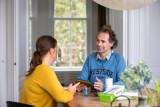
Do you want to encourage people in your organization to help others to use energy more consciously and thus reduce energy bills? This is possible as an Energy Coach of !WOON. Volunteers in for example Amsterdam, Haarlem and Zaanstad come to people's homes as energy coaches by appointment. You will receive extensive training, material and guidance. For more information, visit https://www.wooninfo.nl/vraagbaak/energie/energiecoach-worden/.
Energy coaches are also active in other municipalities in the Amsterdam Metropolitan Area and you can join them. This is organized by various organizations. Some will work with volunteers and there are organizations that work door-to-door with paid employees. Check your municipality's website for more information.
Looking for smart grids or smart buildings internship opportunities
For my master degree in engineering, I am looking for an internship in the smart grids or smart buildings fields. It will start in April 2021 and last 4 to 5 months. My subjects of study are energy (electricity, Heat transfer, renewable energies) and IT (programming, embedded systems, IOT). I want to use my skills to help your community on any project related to energy. I'm particularly interested in programming and IOT.
Currently, I'm working on a smart street light network project. The idea is to design energy efficient street lights that communicate with one another and prevent night time disorders by recording any noise over a given threshold and pushing the data to a supervisor.
Feel free to contact me if you need any further informations.
Warm regards,
Aymeric
De energietransitie uitgelegd

De energietransitie is een van de belangrijkste maatschappelijke thema’s van dit moment en van de komende jaren. Maar wat ís de energietransitie? En wat zijn de specifieke doelen? Wat is het verschil tussen ‘energieneutraal’, ‘klimaatneutraal’ en ‘CO₂-neutraal’? Welke rol kan waterstof (niet) gaan spelen in de gebouwde omgeving van de toekomst? En hoe zitten ons huidige energieverbruik en energiesysteem in elkaar? Deze en andere vragen worden beantwoord in het boek ‘De energietransitie uitgelegd’. Ook komt aan de orde waar de uitdagingen liggen voor de energietransitie en hoe het energiesysteem er in 2050 ongeveer uit zal zien.
‘De energietransitie uitgelegd’ biedt alle basiskennis die nodig is om het nieuws omtrent de energietransitie kritisch te kunnen volgen en een gefundeerde mening te vormen in discussies over dit thema. Er is geen specifieke voorkennis nodig om het boek te kunnen lezen, maar het gaat op bepaalde onderwerpen wel diep in. Hierdoor is het boek interessant voor zowel energie-professionals als geïnteresseerde leken.
Nieuwsgierig geworden? Bestel het boek via uw boekhandel, bol.com of door het sturen van een email aan info@degroenewaterlelie.nl. Bij een afname van 10 of meer boeken ontvang je 5% korting (alleen bij bestellingen via email).
Het boek is gedrukt op boomvrij papier. Er zijn alleen bio-inkten gebruikt en er is gewerkt zonder schadelijke oplosmiddelen.
Smart Energy Community - Kick-off

Interesse in #SmartEnergy voor woningen en bedrijfsgebouwen? Meld je aan voor de kick off van de Smart Energy Community op 17 november!
Programma van 17 november:
Ter inspiratie beginnen we met 2 PowerPitches van inspirerende ondernemers:
• Hoe kunnen de batterijen van Friday Energy grote zonnedaken meer rendabel maken door Bouke Siebenga, Friday Energy.
• Smart Energy oplossingen in alle woningen in de duurzame wijk in Voorhout, door Adriaan Harthoorn, 4YEF (For Your Energy Freedom)
Vervolgens komt Jan Pellis van FAN & Stedin aan het woord, over de twee studies die FAN heeft uitgevoerd naar smart grid ready warmtepompen en smart grid ready laadpalen.
Tot slot hebben we Arjan Wargers van ElaadNL over de resultaten uit de studie 'In-home Energy Flexibility', en tips & tricks om de aansturing van flexibele apparaten effectief en schaalbaar vorm te geven.
Programma: https://bit.ly/SmartEnergyCommunity
Aanmelden: https://bit.ly/sec_subscribe
Let op: dit evenement is in het Nederlands.
Over de Smart Energy Community:
Slimme energiediensten nemen de komende jaren een vlucht, wat vraagt om een intensieve samenwerking tussen betrokken partijen. Wij nodigen hen daarom graag uit om zich aan te sluiten bij de Smart Energy Community voor woningen en bedrijfsgebouwen. Op 17 november vindt de kick-off plaats, in 2021 volgens meer evenementen.
Met deze nieuwe community brengen TKI Urban Energy en Flexiblepower Alliance Network (FAN) de actoren bij elkaar die zich bezighouden met, of meer willen weten van energieflexibiliteit voor woningen en bedrijfsgebouwen. Binnen de community kan actief kennis worden uitgewisseld over wat er nu al mogelijk is, waar de ontbrekende puzzelstukjes liggen, en welke kansen voor innovatie er nog in het verschiet liggen. Natuurlijk biedt de community ook de mogelijkheid om gezamenlijk business te creëren.
Research accelerates the sustainability of heating
AUAS contributes to accelerated roll-out of sustainable low-temperature heating networks in HeatNet project
The international research project HeatNet is all about making heat more sustainable. Less use of natural gas and more use of sustainable heat sources such as the residual heat from data centres. The project aimed to accelerate the roll-out of heating networks in urban areas. And that has been a success! Not only have new heating networks been developed in six European cities, the participating partners have gained knowledge about operating smartly in complex urban transitions. The professors and researcher involved from the Amsterdam University of Applied Sciences (AUAS) talk about the approach and the insights gained.
The role of the AUAS in the research project involves leading evaluations. During six evaluation meetings over three years, the partners reflected on their process of learning from each other and helping each other move forward. Professor of Energy and Innovation, Renée Heller: “As an evaluator, we not only wanted to determine how it went afterwards. But in accordance with the aim of this Interreg project – transnational learning – we embarked on a continuous learning process with each other.”
ON THE SHOULDERS OF GIANTS
This helps the pilot partners gain insights and build on each other’s discoveries. Frank Suurenbroek, professor of Spatial Urban Transformation: “In such complex transition projects, there is so much to consider. This process-based evaluation approach helps you gain insight into the issues you are facing. Such transitions are not a linear process and the insights cannot always be translated directly to other projects. But this approach does make complex processes navigable. It offers pathways for innovation that you can consider.”
The researchers translated this knowledge into various publications and guides, which have been made available to parties dealing with the roll-out of a heating network. Suurenbroek: “The Stakeholder Guide is also interesting for all parties that work on complex urban transitions.” Lecturer-researcher Egbert-Jan van Dijck was responsible for the development of the Stakeholder Guide.
“The heat transition requires an innovation at system level. Therefore, we carried out an extensive stakeholder analysis at meso-level,” explains Van Dijck. “It not only provides an impression of the individuals and organisations involved at the energy sector level, but also of their role in the chain, their interests and concerns. This step towards a situational analysis has enabled us to outline a holistic picture and carry out an in-depth analysis of barriers to the development of the new generation of heating and cooling networks in terms of finance, legislation and regulations and organisation.”
INVOLVING STUDENTS
“We are further expanding this analysis for education.” Van Dijck: Besides the human elements, we also analyse non-human elements, such as buildings, technologies, infrastructure, energy sources and subsurface. These are just as important in determining the situation as the human elements. For example, the pipes for a heating network cannot be laid through a river or a railway track. You need to be aware of these barriers.” Instead of just the people or the stakeholders, students see a much more complete situation at a glance. This goes for fourth-year students as well as second-year students.
Heller: “Several students have used this project for their graduation thesis. Students have even travelled to Ireland on their own initiative to learn more about the energy and heating situation there and to interview partners.”
ROLL-OUT OF HEATING NETWORKS
“There is a lot involved in creating a heating network,” says Heller. “Considering the complexity, it is unusual and significant that all six partners have succeeded in doing so in such a short space of time. It would be a shame not to use the valuable sources of heat available in a country. Data centres, for example, have a huge amount of heat left over. The roll-out of one heating network to multiple heating networks helps us to use available heat sources to increase sustainability and reduce our CO2 emissions.”
INTERDISCIPLINARY AND CROSS-THEMATIC
The HeatNet project is a good example of interdisciplinary collaboration between two research groups with different specialist knowledge. Frank Suurenbroek: “While the implementation of a heating network may appear to be a technical project, it is also an urban transformation process.” Heller adds: “Urban transition involves projects in which taking the energy leap seems the obvious choice, but where there is still little attention for the heat transition, while a great opportunity exists in that respect. Through our collaboration, we have seized that opportunity.”
Amsterdam: Towards flexible electricity grids – innovations on multiple levels

The City of Amsterdam is exploring which FLEX solutions for an electricity grid are applicable in Amsterdam and which conditions are necessary to scale them. How can we organize this innovation? And what should the collaboration, responsibilities, and division of roles between market players and Amsterdam look like? Do you have answers to our questions? Meet and join us online on Monday the 9th of November at 13.00 pm.
FLEXCON 2020 last track: The Value of Energy Fexibility in Buildings

Demand Response & Energy Performance Contracts in Buildings
Learn about the value of Energy Flexibility in Buildings, Energy Performance Contracts and Demand Response services in Belgium, Spain, Italy and Portugal. By Nilufar Neyestani (INESC TEC, Ambience) and Jef Verbeeck (EnergyVille, Ambience)
LEAP blog door DELL!
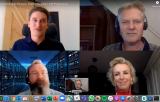
Bij de Amsterdam Economic Board hebben we de rol als ‘transitiemakelaar’; we mobiliseren partijen op onderwerpen om beweging krijgen in een systeem. Soms gaat dat makkelijk als je gelijkgestemden spreekt, soms zijn de belangen net wat anders en moet er meer gebeuren. Zo ook bij het onderwerp waar ik mij nu mee bezig houd – verduurzaming van ICT in datacenters. Dat wat binnen het datacenter afspeelt met dataservers. Je staat er niet bij stil maar het is essentieel voor ieders digitale leventje.
We werken met verschillende partijen samen om met name kennis en bewustwording te creëren om met bestaande mogelijkheden energie te besparen. Ook met grote international hardware leveranciers die een stap maken in het adviseren van klanten waar het gaat om energie-besparen. Dat is namelijk altijd goed.
Daarom zijn we blij dat DELL een podcast heeft opgenomen om hier aandacht voor te vragen, ook ter bewustwording van hun achterban. Bekijk de podcast bij @DellTechNL: https://lnkd.in/dpupEV6
En wat ook leuk is dat we zijn genomineerd voor de #ComputableAwards2020 in de categorie #Duurzaamheid en #MVO. Help ons vooruit door op LEAP te stemmen: https://lnkd.in/dTtb5W5
Information request on collecting energy from road surface
Hi everyone, I'm Olivia, a student from TU Delft. In one of our course projects, my fellow students and I are researching on what can we deal with the energy collected from the road surface (either heat energy or electricity energy). We have done some research on projects like solar roads. But we find a lack of practical information in this field. Therefore, we're trying to look for some people willing to share their experiences in related field. Please feel free to contact me.
FLEXCON2020

FLEXCON2020 is converted in 6 digital tracks, for free. From 23 September to 28 October, we will serve a Smart Energy track every wednesday.
The kick off is coming Wednesday 23 September, with Elia, Enervalis, OpenADR and ElaadNL, they will talk about e-Mobility, Smart Charging and V2G.
We also have Enel X, Siemens, Nodes, Epex, Tennet, EnergyVille, Technolution, DNVGL, Enery Pool, iLeco and Spectral as partners, to name a few.
23 September : eMobility, Smart Charging and V2G
30 September : Flexibility markets
7 October : Buildings, Devices & smart technologies
14 October : Industrial & commercial Flexibility
21 October : New concepts in Energy Networks
28 October : Active managed buildings & energy performance contracts
FLEXCON2020 is FREE, but registration is required.
https://bit.ly/reg_FLEXCON2020
Check our program:
https://bit.ly/FLEXCON2020_prg
CyrusOne Announces Partnership to Research Residual Heat Capture at its Amsterdam I facility to Heat 15,000 Homes in Haarlem

The Municipality of Haarlem, SADC’s PolanenPark and CyrusOne Inc. (NASDAQ:CONE), a premier global data center REIT, today announced the signing of a unique Memorandum of Understanding (MoU) to jointly examine the economic and technical feasibility of a heat re-use project in the region. The MoU follows successful collaboration among the three stakeholders over the last 12 months. It is expected to result in the successful capture of residual heat from CyrusOne’s Amsterdam I data center’s water cooling process, which will feed into a new district heating network to heat 15,000 homes in the municipality. If the plan proves feasible, a new agreement to start development will be signed in the first quarter of 2021, with CyrusOne’s Amsterdam I data center expected to provide the very first source of heat.
This MoU was made possible by the alignment and agreement among the data center operator, the landowner and local government. The partnership marries the Municipality of Haarlem’s pledge to become natural gas free by 2040 with CyrusOne’s stated commitment to be a strategic partner for sustainability.
“It is crucial that we build data centers that work in a way that is compatible with a sustainable future. The COVID-19 pandemic has amplified demand for data center capacity, as consumers become more reliant on digital tools for remote working, learning and entertainment,” said Matt Pullen, EVP and Managing Director, Europe, CyrusOne. “The signing of this MoU is a hugely significant progression for the data center industry, and we hope this is the first of many instances in which local government bodies and land owners, such as the Municipality of Haarlem and SADC’s PolanenPark, demonstrate commitment to work together with CyrusOne on similar sustainable projects.”
“The Amsterdam Metropolitan Area applies very strict sustainability conditions for the development of data centers,” said Arnoud van der Wijk, Project Director, PolanenPark. “PolanenPark and Schiphol Trade Park in Hoofddorp, both developments of SADC, are two of the very few locations in the region that meet these conditions. The use of residual heat is one of the important pillars of both concepts of the so-called Green Datacenter Campus. For PolanenPark, I’m proud that we’re doing this together: using a pipeline to take the waste heat to the homes of Meerwijk and thereby making a great contribution to the energy transition. This project is unique for the Netherlands and far beyond.”
“Haarlem is committed to becoming natural gas free by 2040,” said Robbert Berkhout, Alderman of the Municipality of Haarlem. “This means that the municipality must look for alternatives for heating homes and businesses. With the research into the use of residual heat, Haarlem is taking an important step in the development of a heat network in the district.”
Stay up to date
Get notified about new updates, opportunities or events that match your interests.

